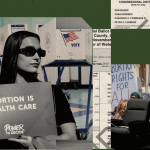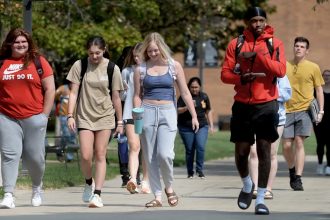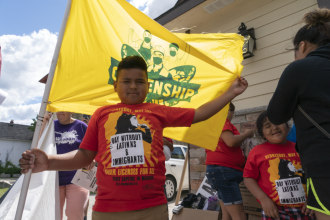TORONTO — Zohran Mamdani is welcome here anytime.
Olivia Chow, the mayor of Canada’s largest city, told me in a recent interview that she was rooting for Mamdani’s mayoral campaign and would eagerly meet with him after New York’s election on Tuesday. (When I began to ask her whether she’d want Mamdani to visit if he wins, she began clapping midway through the question.)
Yet Chow, a more experienced and lower-key politician, also offered some words of advice and caution to the 34-year-old democratic socialist. His proposal to make New York City buses free, for instance, plainly interests her less than the issue that in her eyes defines the politics of affordability.
“In the last few decades, it’s housing,” Chow said.
A progressive who campaigned on affordability issues in her 2023 mayoral campaign, Chow, 68, has a record that highlights the appeal and limitations of the cost-of-living politics Mamdani now champions in New York. Elected after a decade of right-leaning Toronto mayors, Chow vowed to take on her city’s housing crisis, improve public transportation and demand new financial support for Toronto from Canada’s federal government.
She made incremental progress on some fronts, pushing toward a significant overhaul of housing regulations to speed up construction, but has faced a thicket of conflicting interests within the city and Ontario provincial politics. These dynamics preview the opposition Mamdani’s agenda would face from New York City business interests, suburban political power centers and a decidedly non-socialist governor in Albany.
Speaking in Toronto’s hushed, space-age city hall — with a Trump-era “Elbows Up” sign in her office window — Chow warned the only satisfactory solution to the affordability crisis would involve vast new housing investments from national governments. The mayor, who could face a tough fight for reelection next year, said she has made that argument to Prime Minister Mark Carney directly and was waiting to see what kind of support he delivers in the upcoming federal budget.
“He wants to build housing. I want to build housing,” Chow said, adding: “In terms of how much money and where, I don’t know — we’ll see from the Nov. 4 budget.”
Mamdani is unlikely to have such productive conversations with the leader in his own national capital, President Donald Trump, who also casts a shadow over Canadian politics. But at least, Chow said, he creates economic development and talent recruitment opportunities for her own north-of-the-border metropolis.
Her prime example: stealing a top transit official, Mandeep Lali, from New York City.
This interview has been edited for length and clarity.
When I look at the election in New York, it strikes me that there are definitely some echoes of your own race. I wonder how closely you’re following that election, or if you’re following it at all.
Oh, absolutely I am. When life becomes unaffordable, one can get angry, or one can be hopeful that life can be better. I think [for] progressive folks, the message is that if we work together, we can make a difference, make life more affordable and that we can turn that anger into hope.
How much, in your view, is the theme of affordability really all about housing?
In the last few decades, it’s housing. In the mid ’90s, there was the whole ideology of, “Oh, government should not play any role in building any housing that people can afford.” We know it’s a bogus argument, and any country that adopted that wrong ideology is now paying for it. There’s now a pendulum swinging back, as everybody said, “Oh, life is so unaffordable for countries that didn’t build any housing.”
There is a realization — if you want life to be more affordable, if you want a strong middle class — people need to have some money left after they pay rent or their mortgage. If there’s no money left or not even enough to eat, then your entire society collapses. Your small businesses aren’t going to be successful because people don’t have money to buy anything.
Part of your record is about getting the government more involved in building. But there’s also part that’s about getting the government and regulation out of the way of construction. How do you balance the two?
Speed. If people want to build housing that people can afford, they should be able to get it approved in a few months, not a few years. That matters. But that’s only one aspect of it, and building housing needs to be for who actually owns the housing eventually.
And how do you measure affordability? In the last few years, the word affordability has been used to say, “Oh, 80 percent of the market rate.” But it’s still dependent on the market rate. I changed the definition back to where it was in the ’70s, ’80s and ’90s to say “Well, it’s a person’s income.” So, it’s people-based, people-centered, not centered in the market.
One of the proposals that’s gotten a lot of attention in New York is the idea for the government to directly operate grocery stores or for city buses to be free. I wonder how much those kinds of ideas interest you as well.
Yeah, I saw that. Before I came in, the previous city mayor and administration raised the fares by 10 cents and reduced the service. Making public transit affordable, it’s very important. We’ve been able to have no fare increase in the last two years. New York’s [transit system] is pretty old. Ours is very old too, and it has been underfunded for many years. It’s breaking down. We’re now trying to fix the old infrastructure so that we can operate it so that the transfer service is reliable. That would be the first step.
Even if you don’t pay anything, if it breaks down on you, or it doesn’t show up, it’s 20 minutes late, your bus is not arriving — it’s not going to help. So we make it that there’s no fare increase. We have to fix the old infrastructure so it’s more reliable, has faster services. Then we’ll look at how to make it more affordable.
How much do you feel that, as mayor, you have the tools you need to take on affordability?
Eventually, it has to be federal. We don’t deal with the income taxes, corporate taxes, or any of the taxes, really. Per dollar of taxes people pay, only nine cents come through to the city of Toronto, through the property tax. That’s really small, nine cents per dollar, which means that we don’t have the leverage. New York has bonds, Rome has income taxes, [they have] a lot more financial means than the city of Toronto, than municipalities in Canada.
And what have your conversations with the prime minister about that been like?
My conversations with the prime minister urge him to do more building, because he said he wants to build. I said, “Build housing that people can afford, build infrastructure and do it through your capital budget.” Because so far, the offering budget is quite tight, whereas they have a lot of room because they have triple A credit rating and they have a lot of room on the capital side, which is what I think he’s going to do.
And what is your relationship with him like in general?
He wants to build housing. I want to build housing. He wants to build non-market housing. I’ve been saying that for several decades. Great. In terms of how much money and where — I don’t know, we’ll see from the Nov. 4 budget. Good conversations about building the city, building Canada. He understands that this is the financial center of Canada.
Do you have a text relationship? Do you hang out?
Not with the prime minister, but with the minister of housing, yes, absolutely.
How much was the Trump moment echoed in the politics of this?
You probably see the “Elbows Up” sign that I have right there. Been there for a while, since President Trump said that he wants us to be the 51st state of America. No, thank you.
We’re not too bad.
It’s okay. We’re better.
In the summertime, the city of Toronto has 64 festivals where we close the streets. We call it Taste of India. This coming weekend is Diwali — 8,000, 9,000, this whole square is packed with people. There’s one here, this is packed. And there’s a North York Diwali celebration, where there’s fireworks.
But if you look at who goes to these festivals, it’s people of every nationality. They’re all Canadians, but they’re from everywhere from the world. It doesn’t matter your skin color, where you’re from, how old you are, your mother tongue. They celebrate together. It’s this sense of harmony and enjoying each other’s company, feeling this great sense of belonging.
Whereas I see these big demonstrations against immigrants or refugees, the “us and them” that comes through from some of the news stories from the U.S. That’s not what we are.
Is that an opportunity for Toronto, in terms of business development, in terms of talent recruitment?
Oh, absolutely.
What are you doing to take advantage of that?
Well, our universities are out there recruiting professors. Our workforce. Mandeep Lali was managing the New York subway system. We just stole him. We hired him from New York.
We are saying, “Come work here.” Good quality of life, peaceful, safe. You feel really welcome, and we’re a caring city. We are kind to each other. We like to apologize and say thank you.
Does that conflict at some point with the affordability project? Obviously, a big driver of the cost of living is what an attractive place it is for people to move to, to invest in, to own real estate in. Does that wind up actually increasing the burden that you have to deal with on the other side of things?
No, it doesn’t have to be that way.
Prosperity can be shared by everyone. If we are stronger and our city is safer, prosperities are shared. If some people are desperate and see no hope, are angry and despairing, that’s not a society that is necessarily prosperous.
You were outspoken when Trump threatened tariffs on films made in other countries. What steps have you taken to try to prepare for either the possibility that he does that or to lobby against that kind of U.S. action?
Well, at this point, it’s hard to implement the tariff, because it’s not a product you ship across the border. People don’t make films that way. But we are opening up different markets. I was in London, I was in Dublin, working to talk about co-productions and talking about how the city of Toronto has very diverse top-notch talents. And we have pretty generous, stable financial tax credits. We have sound studios that are world-class and ready. If Netflix wants to come and make a film, we are ready.
The idea is to diversify who’s taking advantage of those incentives, so it’s not just Americans?
That’s right. Other people can make films here, whether they’re from London or from Dublin. Dublin is a gateway into the EU in terms of its film industry, and we want to do a lot of co-production with them. So that’s happening.
And if Zohran Mandani wins the election in New York —
I would love to meet him.
Would you host him here?
I can go to New York. My brother lived in New York for quite a long time, so I know Manhattan really well.
Riya Misra contributed to this report.









